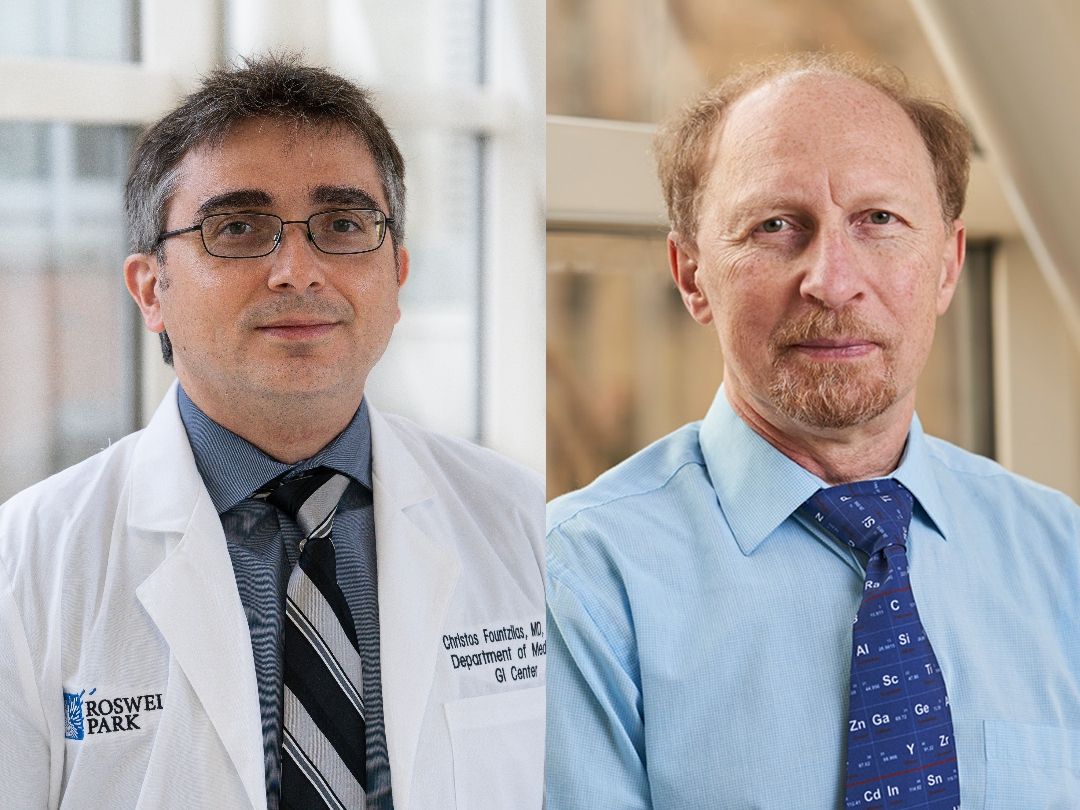Thymidine analog TAS102 plus PARP inhibitor inhibits growth of colon, pancreatic tumors
- PARP inhibitor enhances DNA breaks induced by TAS102, causing cancer cell death
- Findings supported current phase 1 clinical trial for refractory GI cancers
- Study published online in Cell Reports Medicine
BUFFALO, N.Y. — A preclinical study led by a team of researchers at Roswell Park Comprehensive Cancer Center highlights the potential of a novel two-drug treatment strategy targeting p53-mutant cancers. The findings, recently published in Cell Reports Medicine, lay the groundwork for further research, including a phase 1 clinical trial of colon cancer patients that is currently underway.
“Colorectal adenocarcinoma and pancreatic ductal adenocarcinoma are among the leading causes of cancer-related deaths in the United States,” notes study co-author Christos Fountzilas, MD, FACP, Co-Leader of the Gastrointestinal Disease Team and Associate Director for Solid Tumors, Early Phase Clinical Trials Program at Roswell Park. “While the tumor suppressor p53 is inactivated in most cancers, including colorectal and pancreatic, there are no FDA-approved treatments targeting mutant p53, and the p53 status of the tumor is not taken into consideration when formulating a treatment plan for the patient.”
Recognizing the need for better therapeutic options, Dr. Fountzilas and his colleague, Andrei V. Bakin, PhD, Associate Professor of Oncology, Department of Cancer Genetics and Genomics at Roswell Park, initiated a research effort to address the gap. Dr. Bakin, co-author of the study, explains that the research team investigated DNA repair upon challenge with thymidine analogs incorporated into genomic DNA during replication, hoping to better understand DNA differences in cancer and normal cells. They discovered that p53-mutant cancer cells accumulate DNA breaks due to post-replicative removal of thymidine analogs. The data show that suppressing the PARP protein, which enables cancer cells to repair themselves, enhances DNA damage induced by thymidine analogs, leading to cancer cell death.
“We found that the two-drug combination — the thymidine analog trifluorothymidine TAS102 plus a PARP inhibitor — works together to inhibit the growth of colon and pancreatic cancers, including patient-derived tumor xenografts,” says Dr. Bakin. He says this research sheds light on the mechanisms behind the synergistic action of the two-drug combination and provides a scientific foundation for further investigation.
“While trifluorothymidine was developed in the 1960s and PARP inhibitors in the early 2000s, the current work presents the first application of the two-drug combination for selective targeting of p53-mutant cancers,” Dr. Fountzilas adds. “Of note, while PARP inhibitors are approved for treatment of cancers with deficiency in homologous recombination (HR), this novel two-drug combination works in HR-proficient cancers, expanding the utility of PARP inhibitors to the majority of colon and pancreatic cancers.”
This preclinical study demonstrated the increased efficacy of trifluorothymidine in combination with a PARP inhibitor for the treatment of p53-mutant colorectal adenocarcinoma and pancreatic ductal adenocarcinoma. The findings offer another potential treatment strategy that could be extended to different cancer types beyond colorectal and pancreatic.
“Importantly, this basic science discovery has been moved to testing in clinical settings,” concludes Dr. Bakin. “The two-drug combinatorial strategy is now being examined in the first-in-human phase 1 clinical study for refractory gastrointestinal cancers, and we are investigating the next series of drug combinations based on this initial success.”
###
From the world’s first chemotherapy research to the PSA prostate cancer biomarker, Roswell Park Comprehensive Cancer Center generates innovations that shape how cancer is detected, treated and prevented worldwide. Driven to eliminate cancer’s grip on humanity, the Roswell Park team of 4,000 makes compassionate, patient-centered cancer care and services accessible across New York State and beyond. Founded in 1898, Roswell Park was among the first three cancer centers nationwide to become a National Cancer Institute-designated comprehensive cancer center and is the only one to hold this designation in Upstate New York. To learn more about Roswell Park Comprehensive Cancer Center and the Roswell Park Care Network, visit www.roswellpark.org, call 1-800-ROSWELL (1-800-767-9355) or email ASKRoswell@RoswellPark.org.
Rebecca Vogt, Media Relations Specialist
716-845-4919; rebecca.vogt@roswellpark.org
